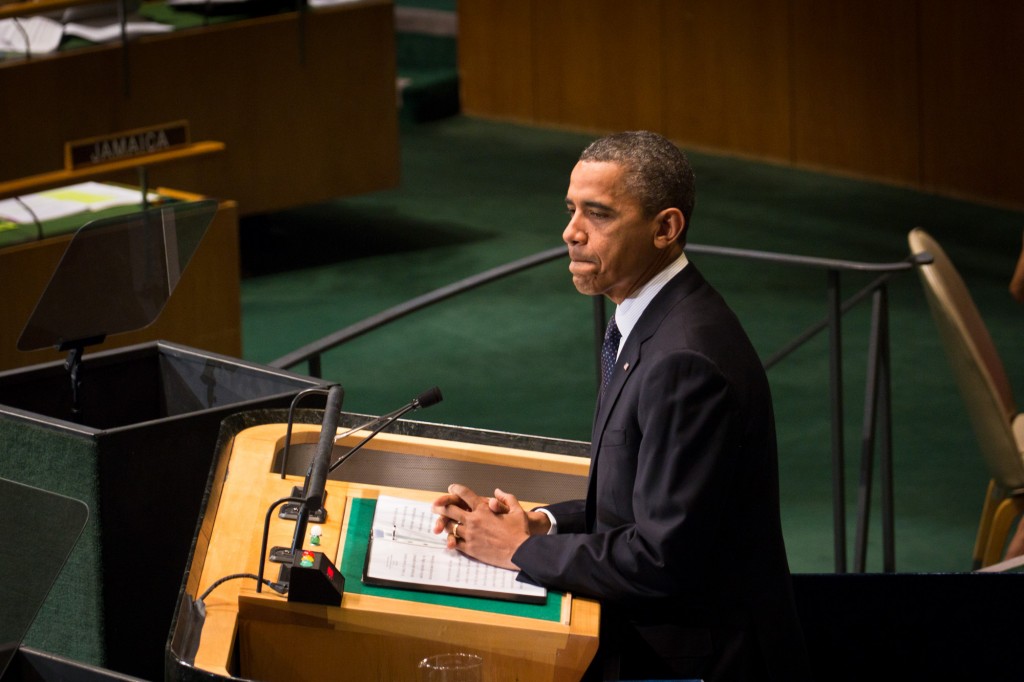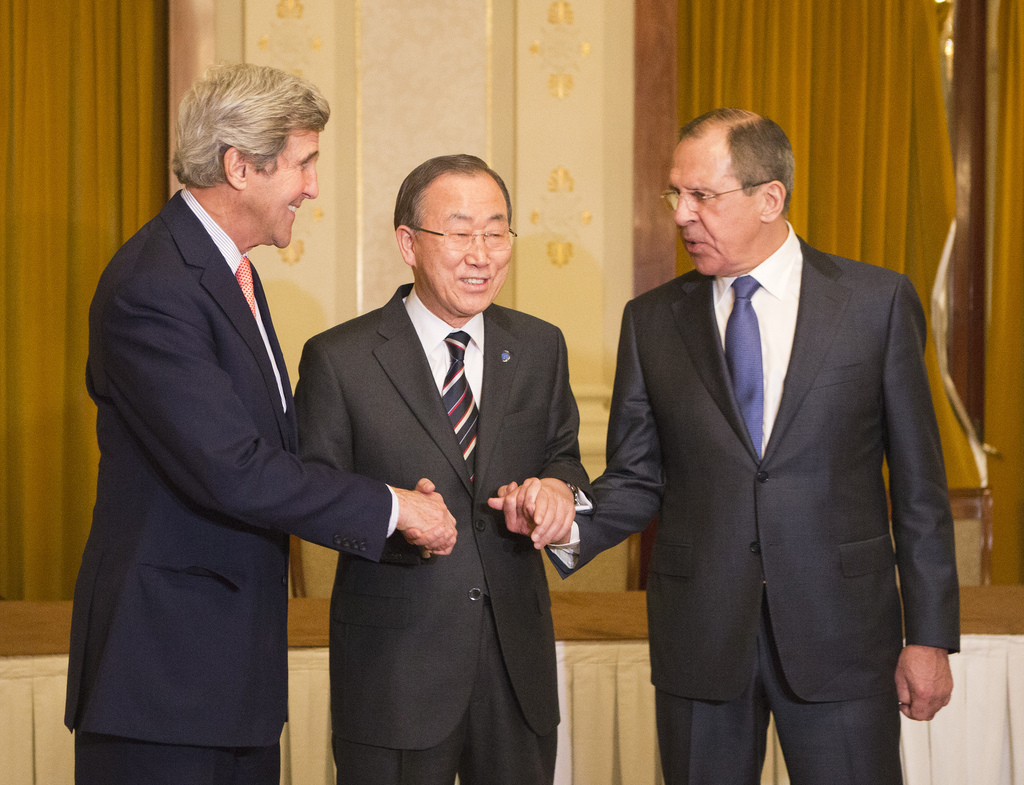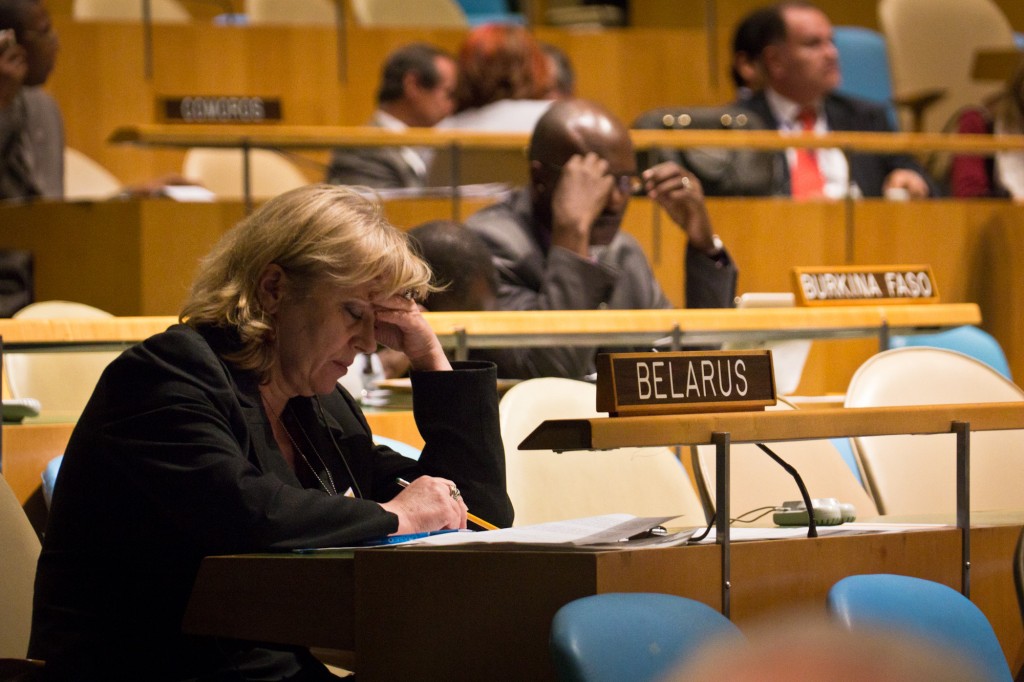U.S. funding of the UN has become so outlandishly disproportionate, and the diplomatic benefits so hard to measure, as to force the question: What, exactly, are American taxpayers getting for their investment?
In the long and bizarre history of America’s role at the United Nations, one especially poignant moment came in December 2007, with the passage of the organization’s multi-billion dollar core budget by the General Assembly. Usually these budgets are approved by consensus. But that year, in a push for UN reform, the United States raised strong objections. The debate turned into an all-night marathon. Finally, at 5:55 A.M., the budget was put to a vote. More than one-quarter of the member states declined to show up. The rest voted to adopt the budget by an overwhelming majority of 142 to 1. That lone holdout was the United States—the largest contributor by far to the UN.
In response to that vote, Secretary-General Ban Ki-moon’s press office released a statement thanking the General Assembly and welcoming the record-breaking new budget, but regretting that for the first time in twenty years the budget had required a vote. Implicitly scolding the Americans, Ban’s office urged all member states “to return to consensus decision-making and to demonstrate a greater sense of flexibility and compromise, beyond individual national interests and in the common cause of multilateralism for the good of humankind.”
That episode stands out not because it is rare at the UN for others to gang up on the U.S., but because the 2007 budget vote removed the veil of consensus, clarifying in stark terms the UN’s underlying financial reality. Since the founding of the UN, in 1945, the U.S. has paid the lion’s share of the costs. But in a UN that has expanded from the original 51 member states to 193, the United States, like all the others, gets just one vote. Broadly, this means that while America picks up the biggest share of the tab, other states choose the agenda, concoct the budgets and decide how the money gets spent.
It’s no secret, of course, that the U.S. plays chief sugar daddy to the UN. But it’s easy to lose sight of just how egregiously this system abuses the generosity of American taxpayers and takes painful advantage of American good will. The overall UN system is byzantine in the extreme, generating budgets and collecting funds—both assessed and voluntary—across a host of UN bodies, agencies, programs, special initiatives and appeals. There is no precise formula that applies uniformly across the entire system—in fact it is surprisingly difficult to get a precise accounting of the entire UN’s budget at all. But some of the big-ticket items provide a good rough guide.

President Obama, speaking at the UN General Assembly in 2012, is perhaps frustrated that his government’s munificent funding of the organization isn’t leading to pro-U.S. outcomes. Photo: John Gillespie / flickr
Among the UN’s 193 member states, the U.S. pays for 22 percent of the General Assembly’s regular budget, and more than 28 percent of peacekeeping—in both cases the highest rate of any member state. And traditionally, the U.S. has bankrolled roughly 25 percent of the much larger, overall UN system, for which the UN in 2012 reported revenues totaling $41.5 billion.
By now, the UN’s system-wide funding has dwarfed the General Assembly’s regular budget, which currently totals roughly 2.75 billion per year, or less than 6 percent of the UN’s total take. But the over-sized U.S. contribution to this so-called core budget has long set the tone, and served as a rough template for U.S. contributions, whether voluntary or assessed, throughout much of the UN empire. In this core budget, as former pentagon official and International Criminal Court and U.N. scholar Brett Schaefer calculates, the U.S. dues of 22 percent amount to more than the dues paid by the 178 least-assessed states combined—for whom the collective total comes to 20.765 percent. Peacekeeping is even more skewed. Currently the U.S. pays more than 28 percent of an annual UN peacekeeping budget that totals well over $7 billion. By Schaefer’s calculations, that is more than the 185 least-assessed states combined, which chip in a collective total of less than 26 percent.
By what standard is this massively disproportionate UN burden on U.S. taxpayers justified? The U.S. is not the most populous nation in the UN. That honor belongs to China. The U.S. does not reign over the most territory. That privilege goes to Russia. The U.S. does not enjoy the world’s highest per capita income. That pleasure goes to such members as the oil-rich Arab state of Qatar, or financial havens such as Switzerland and Luxembourg. And though the U.S. has the world’s highest gross domestic product, its core UN dues of 22 percent amount to more than four times the 5.1 percent paid by China—despite having only roughly double the GDP. How, exactly, is this fair?
So maybe fairness isn’t what we should be focusing on. Indeed, many people argue that considering the advantages America gets to its global economic, diplomatic and strategic interests, it’s a small price to pay. But does America’s open wallet actually buy extravagant influence at the UN? A careful look at the benefits America gains compared to other nations suggests otherwise.
True, the U.S. enjoys the privilege of a veto-wielding permanent seat on the 15-member Security Council. But the U.S. shares that privilege with the other four members of the Permanent Five (P5)—Russia, China, Great Britain and France—whose core dues combined total 18.35 percent of the regular budget, less than the 22 percent paid by the U.S. alone. When controversial matters come before the Security Council, the U.S. must haggle not only with the P5, but with the countries that for two-year terms rotate through the other ten Security Council seats. Over the past dozen years that group has included such tyrannies as Bashar el-Assad’s Syria (2002-2003) and Moammar Qaddafi’s Libya (2008-2009), as well as such cranky sometime friends as Turkey (2009-2010) and Pakistan (2012-2103).
The results range from Security Council paralysis to watered-down resolutions that too often fail to solidly reflect U.S. interests. This has not been helped by U.S. policies outlined by President Obama when he told the UN General Assembly in 2009 that “No one nation can or should try to dominate another nation” and “No balance of power among nations will hold.” Far from taking this as an inspiration to live in brotherly peace and fill the communal pot, some of the more opportunistic UN member states appear to have received it as an invitation to grab whatever they can get. Russia and China have been ever more aggressively pursuing anti-American interests, including increasing engagement with terror-sponsoring Iran and actively preventing action to stop the atrocities in Syria. Following a spate of Security Council sanctions resolutions meant to stop Iran’s rogue nuclear program, in 2006, 2007, and 2008, the Council has not produced another since 2010. When civil war engulfed Syria starting in 2011, Russia blocked Security Council action for more than two years, until finally, in Sept., 2013, the U.S. deferred to a Russia-brokered deal to relieve Syria’s Assad regime of its chemical weapons in exchange for effectively shoring up Syria’s President Bashar Assad—and allowing the killing to continue unabated.

U.S. Secretary of State John Kerry, UN Secretary General Ban Ki-moon, and Russian Foreign Minister Sergei Lavrov congratulate themselves on a job well done at the Geneva II conference, on Syria, January 21, 2014. Photo: US Mission Geneva / flickr
In the General Assembly, U.S. money has similarly not bought friendship. On the contrary, U.S. funding has fostered an entitlement culture, in which the U.S. is not only taken for granted as a cash dispenser, but also systematically denounced and defied. Nations deeply hostile to the U.S. have made an art of twisting the UN system, flush with U.S. resources, for their own aims. A prime exhibit is Iran’s current three-year chairmanship (2012-2015) of the so-called Non-Aligned Movement, which with 120 members is the second-largest voting bloc in the UN General Assembly. At the UN’s New York headquarters, the largest voting bloc, the Group of 77, with 133 members, is currently chaired by Bolivia—where the anti-American government maintains close ties to Iran.
The practical results of such arrangements can be found in the annual reports submitted by the State Department to Congress on “Voting Practices in the United Nations.” The most recent report, released last April and covering 2012, records that of all General Assembly resolutions put to a vote, fewer than half the UN member states—just 42.5 percent—aligned themselves with the U.S. For votes on resolutions the State Department judged “important,” the coincidence of countries voting with the U.S. was even lower: a mere 35.4 percent.
The slant is even worse on resolutions related to Israel, a democratic nation and U.S. ally which the UN targets more than any other state for condemnation. The State Department report notes that “Israel is singled out repeatedly for criticism, while the resolutions do not fully acknowledge that all parties to the conflict bear direct responsibility for ending it.”
Of 19 resolutions on Israel put to a vote at the 2012 fall session of the General Assembly, the coincidence of members voting with the U.S. was an abysmal 3.7 percent, down from 4.1 percent in 2011 and 4.4 percent in 2010. Apart from Israel itself, just nine other countries cast any votes aligned with the U.S. Of these, the only member states to vote consistently with the U.S. were Canada, the Marshall Islands and Palau.

Belarus and Burkina Faso have just as much power as the U.S. in the UN General Assembly. Photo: John Gillespie / flickr
A landmark illustration of this opposition to the U.S. was the General Assembly vote in November 2012 to enhance the status of the Palestinian Authority to non-member Observer State. The Palestinian push to claim statehood via UN resolutions is a violation of Palestinian promises in the 1993 Oslo Accords to arrive at statehood by way of negotiations with Israel. But over U.S. objections, the General Assembly voted 138 to 9 in favor of the Palestinians.
Likewise, at UN agencies, pocketing U.S. money is no bar to mocking U.S. policy. In this, the recent pacesetter has been the UN Educational, Scientific and Cultural Organization (UNESCO). Based in Paris, UNESCO had by the early 1980s become such a swamp of corrupt and anti-American policies that the U.S. pulled out of the organization entirely. In 2003, under President George W. Bush, the U.S. returned, and resumed paying for 22 percent of UNESCO’s annual budget—a contribution of almost $80 million per year. That river of money did not dissuade UNESCO’s member states from voting in 2011 for UNESCO to become the first UN agency to grant full membership to the Palestinians, over American objections and despite the lack of a recognized Palestinian state. UNESCO’s members knew this move would trigger U.S. laws forbidding funding to any international body that might try to confer statehood prematurely on the Palestinians. Nonetheless, they voted 107 to 14 to admit them. Since then, UNESCO, in tandem with the Obama administration itself, has been campaigning for the U.S. Congress to change U.S. laws in order to resume the flow of money to UNESCO—which from its posh Paris headquarters cleaves to the UN habit of singling out Israel for condemnation.
This UN culture, which is unceasingly hostile to the U.S. and its key allies, is a natural product of a UN entitlement system in which the United States shoulders the main load, while some of its worst enemies get a virtually free ride. This arrangement had its origins in the 1945 UN Charter, which says that “the expenses of the Organization shall be borne by the Members as apportioned by the General Assembly.” The General Assembly then embellished that power into what it now routinely describes as “the fundamental principle that the expenses of the Organization shall be apportioned broadly according to capacity to pay.”
Yet by any reasonable measure, the U.S. pays vastly beyond its capacity in proportion to other countries, including some very wealthy players such as China, Japan, Germany, and the Gulf states; or some very powerful global actors such as Russia. The “capacity to pay” is assessed especially oddly in the case of UN-sanctioned North Korea, where Kim Jong Un’s regime starves its people, but finds the resources to keep Kim in palaces and yachts, sustain one of the world’s largest armies, and build nuclear weapons. Last year, under the UN’s version of working together for the good of humankind, Kim’s regime in exchange for the privileges and perquisites of UN membership was billed for core dues of 0.006 percent, amounting to a gross contribution of $168,677.
Or take the case of oil-rich Iran, which in recent years, despite UN sanctions, has parlayed its UN membership into seats on the governing boards of more than half a dozen major UN agencies, and well as chairing the Non-Aligned Movement. Iran’s core dues for 2013 came to 0.356 percent of the UN budget, for a gross contribution of $10 million. In effect, North Korea and Iran are subsidized at the UN by the U.S., which during that same period paid $618 million in core dues alone.
All this covers only a sampling of the confidence game that UN funding has become. The real total of U.S. contributions to the UN is something of a mystery. The most readily available figures come from the State Department, but those multiple billions are almost certainly well short of the full truth. There are numerous other arms of the U.S. government that have a record of contributing to the UN. Following a bout of major UN scandals that came to light around 2004-2005, notably the Iraq Oil-for-Food program, the U.S. Congress began requiring a full accounting from the Office of Management and Budget for all U.S. funding, across the board, to the UN system.

These tapestries of the UN’s Secretaries-General, which hang at its headquarters in New York, were donated by the Islamic Republic of Iran. Photo: Kirill Levin / flickr
That requirement expired in 2011, however, and has not so far been renewed. The last year for which OMB provided a grand total was fiscal year 2010, when U.S. contributions totaled $7.7 billion. The full amount today is almost certainly higher. If the U.S. has carried on with tradition, and is currently bankrolling one-quarter of the UN system that reported revenues for 2012 of $41.5 billion, that could imply a U.S. dole of more than $10 billion.
What does the U.S. get for its disproportionate billions poured into the UN? It funds what is in effect an entitlement program for the world’s biggest, least grateful and in some cases most hostile gang of welfare clients. It makes no sense, neither as a function of fairness nor in any reasonable cost-benefit analysis. Could there be a better way?
![]()
Banner Photo: knowsphotos / flickr





